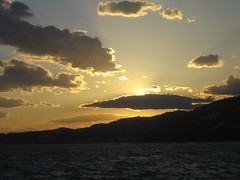Sunday, 21 June 2009
Friday, 12 June 2009
Wednesday, 10 June 2009
Sierra de Teruel

It is performed with little rehearsal but a great deal of passion by a mostly amateur cast, and this gives it a raw, documentary feel. The film culminates in a magnificent 10-minute scene in which the villagers help bring the wounded - and dead - airmen down from a mountain-top crash; this scene is apparently much shortened - or even cut? - in the Espoir version.
Víctor Erice introduced the showing with an account of the film's genesis, and an analysis of the differences between the two versions. It was a very affecting talk, which he himself found difficult to deliver at times, in particular when, at the end, he referred to the film as "una elegía para la Segunda República Española" ("an elegy for the Spanish Republic"). After the film he showed two short extracts from his current project, one of which is his own filmic response to Sierra de Teruel.
I would very much like to see if it could be possible to arrange a showing of this film at the ACIS Conference this September.
Cinema and the Spanish Civil War

I've managed to get up for a couple of sessions so far. Last week I saw Canciones para después de una guerra (Songs for after a war), which, to my shame as an aficionado of cinema and popular music, I had not seen before. The film is not so much about the Civil War, as a commentary on the society that grew out of it. It's an amazing, fast-moving montage of images of life in Franco's Spain, still and movie, much of it from advertisements or official sources such as NoDo, and all accompanied by a barrage of popular songs of the period, some classics, some hilarious, some both.
The film gives a startling visual and aural impression of la España carpetovetónica - the retarded state in which Franco struggled to keep Spanish society for 40 years. I've got a very funny book* about this somewhere, a collection of cartoons and advertisements from the Spanish press of the 60s and 70s, which makes an interesting complement to the images and sounds of this film.
* Celtiberia Bis, by Luis Carandell (1974) - there's a blog in the same spirit at No recomendable, and an article by Carandell from El País: Y España era celtiberia.
Saturday, 6 June 2009
Subscribe to:
Comments (Atom)


